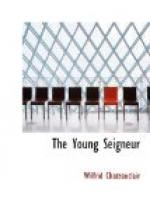Art seemed to me then the Highest Thing.
CHAPTER XIII.
SOMETHING MORE OF QUINET?
One evening as we sat on the Pincian Hill, in the semi-tropical garden, overlooking the domes and towers of the Imperial City, Quinet broke our silence, and surprised me by saying abruptly:
“Let us go to England.”
“What for?”
“Let us go; I wish to go.”
“But what is your press about England. I thought you hated the English.”
“I do not hate the English. Among whom are there more amiable friends, more beautiful women. I am seized with a wish to see that great people in their country.”
“You hated them some time ago.”
“In the present tense, that verb has with me the peculiarity of parsing itself negatively.”
I reflected a little on this change of opinion in Quinet, and its possible causes, till he again broke out abruptly:
“Miss Carter gave me a message for you.”
The recollection of my conduct at Picault’s sent a pang through me.
“What is it?” I said. The tropical plants around us brought up vividly those at the ball.
“I did not ask her,”—his voice was curious—“what it meant, but she desired me to say for her; ’I beg you to write me why you left the ball.’”
“So you do her page-work,” I returned, for I thought I could now divine the reason of his change towards the English. “Pretty work for a grown knight! If you know her so well, you know the picturesque groves of St. Helen’s Island where she lives. Why stop at page-work? One would think with an enchanted isle, and an enchanting maiden, the Chevalier would find his proper occupation.”
Quinet changed aspect. “Do you not then admire her?” he advanced quickly, with uncontrollable feeling.
“Not admire Grace Carter!” said I, for I felt as if I had done her injustice when I last left her,—“Yet no more than a friend, Quinet.”
“Is that the fact?” he cried, springing up—“I thought it was she you were in love with! I heard you were in one of Picault’s alcoves together.”
CHAPTER XIV.
THE ENTHUSIASM OF LEADERSHIP.
“Dans quelle terre a borderez-vous
qui vous soit plus chere que celle
ou vous etes ne?”
—PAUL ET
VIRGINIE.
When I reached home my father took me to Dormilliere. “The purpose is very special,” he said, so gravely that I trusted his wisdom and hastily despatching to Alexandra a brooch of Roman mosaic, which I had bought for her in Italy, I left with him.
Life had another offer now to extend to me—Dormilliere, and the power thereof. As we approached the pier, and I beheld its three green terraces one over another; the grove of pines on the hill-top above the terraces; and cottages, white, red and grey, appearing among the pines;—dear home unvisited so long;—and the spires of the Church in the sky glinting the light of the setting sun, and on the shore and pier familiar faces of old men and young men changed; boys grown into stalwart fellows, and babes into boys and girls; many quiet visions of youth rose and mingled with my thoughts, and this spell began its working, as those of Society and Art had done.




